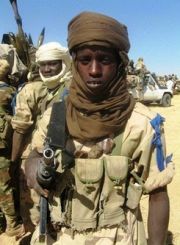Chad rebels deny peace talks with government
February 21, 2008 (N’DJAMENA) — Chadian rebels denied a government assertion on Thursday that they had begun peace talks, dampening hopes for a negotiated settlement as European peacekeepers flew in to the central African country.
 Foreign Minister Ahmat Allam-Mi told reporters in Brussels after meeting senior European Union officials that the government was talking “at this moment” with the rebels, who attacked the capital this month. He gave no further details.
Foreign Minister Ahmat Allam-Mi told reporters in Brussels after meeting senior European Union officials that the government was talking “at this moment” with the rebels, who attacked the capital this month. He gave no further details.
“We negotiate constantly with the rebels,” he said.
Chad’s government has been under pressure from the European Union to hold talks. The instability is hampering international efforts to deliver aid to half a million refugees from Sudan’s Darfur region and Chadians displaced by violence.
Rebel spokesman Ali Henchi Ordjo denied Allam-Mi’s statement that negotiations were underway, accusing him of trying to manipulate the international community into believing that the rebellion had been militarily defeated.
“It is completely untrue. It is absolutely untrue. There are no negotiations. It is a manipulation of information, an attempt to brainwash international opinion,” Ordjo told Reuters.
“It is a way of saying that the rebellion has been conquered, that it is looking to negotiate. It is just another form of combat. It’s a song we’ve already heard before.”
Several rebel factions, who denounce President Idriss Deby’s 18-year rule as corrupt and dictatorial, attacked the capital N’Djamena just over two weeks ago. The fighting killed 160 people and forced the evacuation of aid workers.
A string of peace deals, brokered by Libya and Saudi Arabia, have collapsed over the last year.
African Union Commission Chairman Jean Ping and European Union Aid Commissioner Louis Michel, who met with Allam-Mi, both said it was vital to restart dialogue.
“It is absolutely necessary to re-establish as quickly as possible the climate of confidence which politicians from all sides had reached in the past months,” Michel said.
HUMANITARIAN EMERGENCY
Deby and senior Chadian government officials have previously dismissed the idea of talks with the rebels, saying simply that the army had defeated their assault on N’Djamena this month.
They accuse Sudan of backing the rebels, a charged denied by Khartoum which in turn accuses Chad of backing Sudanese rebels.
Hopes for serious talks have also been undermined by the disappearance of opposition figures following the street battles in the capital and a subsequent security crackdown which has forced leading human rights campaigners underground.
Several of Deby’s opponents, including former head of state Lol Mahamat Choua, were taken from their homes in N’Djamena by armed men in uniform immediately after the rebel assault.
Allam-Mi said an investigation would be opened. The EU said its representative in N’Djamena had visited Choua, who is being detained at a military barracks, and that he was in good health.
Relief agencies warned this week that renewed fighting in both Chad and Darfur had forced thousands more civilians to flee and risked causing a new humanitarian emergency.
Beatrice Godefroy, head of the Swiss branch of Doctors Without Borders in Chad, told Reuters up to 8,000 refugees had poured across the border from Darfur last week and were living rough in the desolate area around the border town of Birak.
The first 50 members of an Irish contingent to be deployed in Chad as part of a European Union peacekeeping force to protect the displaced arrived in N’Djamena on Thursday and were due to go straight to the turbulent border region.
The Irish soldiers — who will eventually number 450 — will be the second biggest foreign military presence in the country after those from former colonial power France, whose troops will make up the majority of the 3,700-strong EU force (EUFOR).
The EU mission to Chad complements a much bigger African Union/United Nations peacekeeping force planned for Darfur.
(Reuters)
